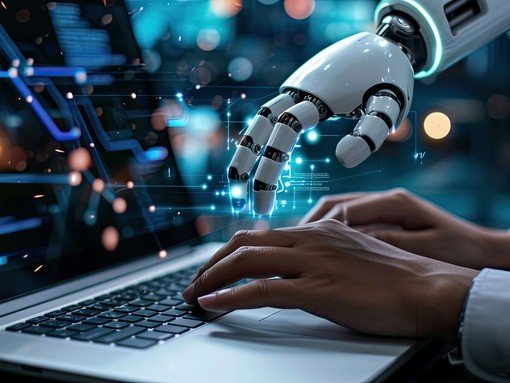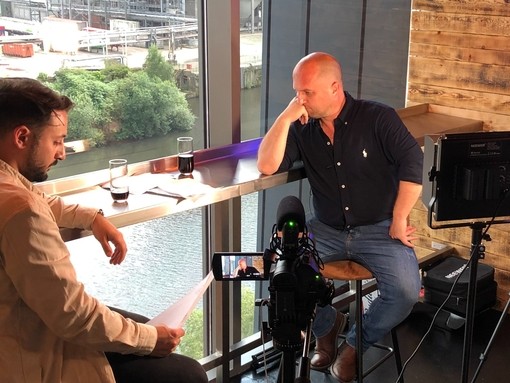
How Artificial Intelligence is transforming workplace operations
Artificial Intelligence (AI) has the potential to transform the way companies run. While many people are using AI tools like ChatGPT in their professional and personal lives, the potential for AI in industry goes way beyond chatbots.
AI is not just another tech trend; it’s a force that’s here to stay. It can innovate, streamline processes and increase productivity to unseen levels, far beyond previous passing trends.
We’re expecting to see businesses utilising AI to boost efficiency, unlock cost savings, automate routine tasks, and show market trends. It is set to change the workplace of various professions and industries. Read on to find out how AI is changing key industries such as:
Professional services
Oil and Gas
Engineering
Tech

Professional services with AI: Transforming business growth and success
Legal Research:
AI lends support in legal research, contract analysis, and due diligence procedures.
Legal research is a time-consuming and intensive processes that relies on employees having to extensively analyse enormous volumes of data with precision. But with new AI development, there are tools which can rapidly quantify the data within a matter of seconds, without the implications of human error. This will save invaluable time for lawyers and solicitors who can redirect their time to provide the clients with the best advice, smallest margin of error and ensuring compliance with legal standards. Ultimately maximising efficiency for all parties involved.
Financial Sector:
In the financial sector, Artificial Intelligence algorithms can recognise market trends, manage investment portfolios, and easily detect fraudulent activities. Financial advisors are then able to change their focus onto higher-level financial planning, building client relationships, and offering personalised counsel. By using the data obtained by the Algorithm, employers will be able to curate and tailor the best possible portfolio for each individual client more consistently and efficiently.
Consultancy:
AI will also massively improve consultancy, with algorithms rapidly deciphering useful information from huge datasets, which will ultimately lead to consultancy firms being able to expand their service offerings, by reducing costs, increasing their accuracy and supplying much better value to their clients. Because AI can rapidly complete processes involving the data this will ensure that the consultants can focus their time on activities such as strategic thinking which enables faster and much more efficient innovation.
Revolutionising the Oil & Gas industry
Exploration and Drilling:
AI can perfect drilling processes, by analysing similarities with previously found reserves to forecast prospective oil reservoirs. AI can also protect workers on site as it can monitor weather trends and conditions so that managers can make the best decision with minimal risk of accidents. Engineers can oversee AI algorithms, while geologists and drilling experts can utilise the information supplied to make informed decisions. AI could be the driving force for rapid change from traditional operations and procedures to digital ones.
Predictive Maintenance:
Artificial intelligence can now identify when there are mechanical issues and locate them rapidly. This is a huge technological advancement for the Oil and Gas industry as if faults are left unsolved, they can become serious issues quickly. This can now save copious amounts of time for businesses and potentially save workers from harm. AI can also highlight equipment glitches, which will massively reduce downtime, a factor which has been a common issue in this industry for years. Maintenance staff will now be able to join efforts with AI systems to guarantee seamless operations and quickly identify issues so they can conduct repairs. Because of this, we are starting to see studies released such as one in 2022 where EY found that 92% of Oil and Gas companies are already using and, if not already, committed to using AI within the next 2 years.
Reshaping the Engineering Landscape with AI
Design and Simulation:
When expressing engineering capabilities AI lends a hand in crafting intricate designs and executing simulations for engineering projects. Engineers can benefit from insights to enhance their designs, address unforeseen challenges all thanks to algorithms. This is a vital piece of technology as now businesses can simulate large projects and test the integrity of the structures through multiple conditions to maximise safety and with no extra costs or unforeseen faults due to human error. An extremely important example of this is using AI to create super fuel cells
Structural Health Monitoring:
Structural health monitoring may be deemed as the most significant implication of AI in recent years, this is due to the real-time scanning and reporting the algorithm does. It can identify faults in pipelines, structural issues in things like bridges and plants and even locate them through a stream of sensors. This makes issue solving a much faster and safer task. Which minimises the risk on workers and upholds the project to expected safety standards. as these issues can normally be resolved almost instantly. This is taking the industry by storm as employers can hire workers who can work together with Artificial Intelligence to speed up the process of operations from start to finish.
Navigating the Tech & IT domain with AI
Software Development:
AI development into the IT and Tech sector is drastically changing the processes of software development. Machine learning and Natural Language Processing (NLP) are streamlining coding by identifying issues and self-teaching to build on the code to make it more efficient. This is critical in benefit for technological advancement as AI is cutting down time and speeding up the delivery of newer algorithms. This is huge for the Tech industry as they can offer employers in various sectors a clear way to improve productivity, efficiency and reduce costs. An outstanding set of factors for any employer trying to be at the height of competitiveness.
Cybersecurity:
AI detects patterns of cyber threats and breaches, bolstering threat detection and aiding with finding the most suitable response. By having an AI algorithm constantly checking for unusual network traffic, it can improve network scrutiny by anomaly detection. The speed that the algorithm can detect this makes it much easier for the cyber security team to act on the attempted hack, minimising downtime for the employer and ensuring minimal impact on operations and data breaches for employee and client safety.
Data Analysis:
When it comes to datasets artificial intelligence is making monumental ground. With the development of ‘big data’, defined as extremely large datasets which can be used to analyse human interactions and behaviours, can now analyse patterns of consumer or client behaviour to determine the most suited advertisement. This is huge for recruitment companies as they can now use AI to target workers with new potential job offers based on their behaviours.
Across these industries, while Artificial Intelligence can automate select tasks, human expertise still is vital for intricate decision-making, inventive problem-solving, strategic plotting, and interpersonal exchanges within business operations. Combined or hybrid AI integration seems to be the most suitable workforce upskilling as this benefits both the employer (for recruitment, profit & competitiveness) and the employee (productivity and efficiency).
Looking to kickstart your career? We’re hiring for a range of roles across the UK. Search our latest opportunities here.
- IT & Digital
- Tech
2023 tech trends: the half year review
Businesses need to evaluate where to invest their time and resources if they want to stand a chance in the dynamic ...

- Tech
- Artificial Intelligence
- IT & Digital
Is artificial intelligence a threat to the music business?
Some might say Oasis were just a Beatles tribute act. Did artificial intelligence just prove it? The rise of artifi...

- Tech
- Employers
Turning the heads of tech talent: It’s time for companies to get creative
The pandemic transformed nearly every organisation into a tech company. We explore how companies can work on creat...

















